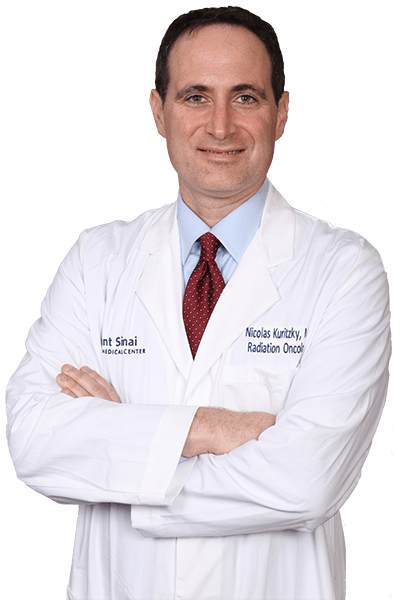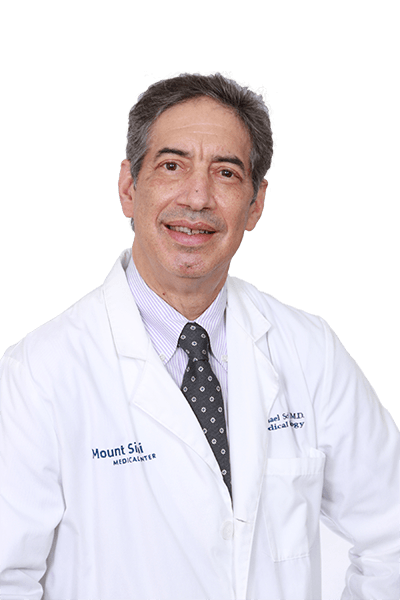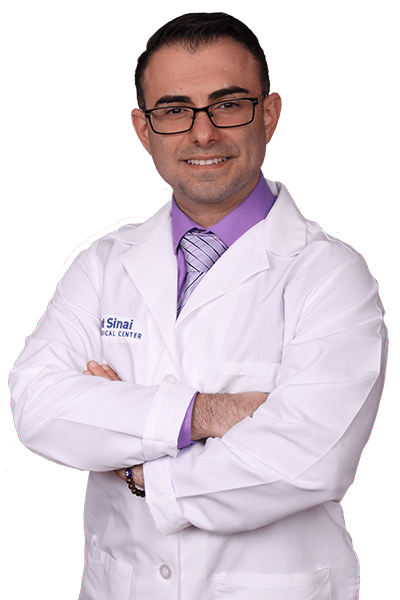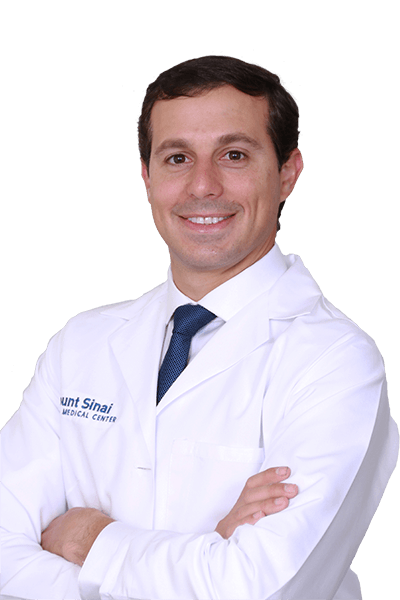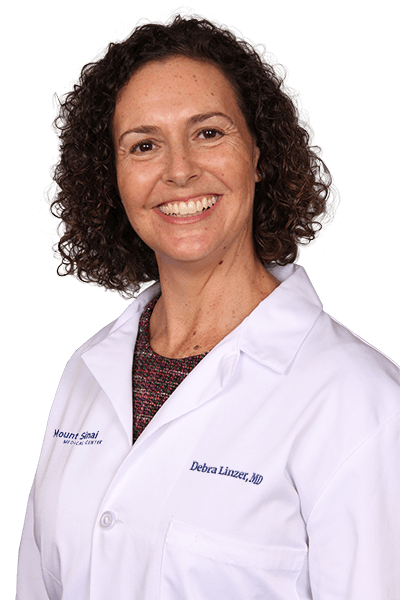Types of Lung Cancer
Mesothelioma
Mesothelioma is a type of cancer that affects the mesothelium, which is a thin layer of tissue that covers all of your internal organs. This type of cancer is most frequently seen in the mesothelium that covers the lungs, and we believe that exposure to the chemical asbestos is the primary cause of mesothelioma. Unfortunately, there is no cure for this type of cancer; however, at Mount Sinai we have a number of treatments available to slow the progression of the disease and to help improve the quality of life for patients diagnosed with mesothelioma.
Treatments
Since most patients with mesothelioma are diagnosed after their disease has advanced, surgery to remove the cancer is rarely an option. However, at Mount Sinai we use surgical approaches for managing the disease, including to remove excess fluid that accumulates around the lungs, to remove one of the affected lungs, or to remove part of the mesothelium to make patients more comfortable. In addition, certain chemotherapies and radiation treatment have been shown to slow progression of the disease and to alleviate symptoms and pain.
Non-Small Cell Lung Cancer
Non-small cell lung cancer is the most common type of lung cancer, making up 85% of new cases and affecting 200,000 people each year. While non-smokers can get non-small cell lung cancer, smoking cigarettes is the greatest risk factor. Quitting smoking or not smoking at all are the best steps people can take to avoid developing this type of lung cancer.
The name comes from how this type of cancer cells looks under a microscope. The disease develops from the cells that line the inside of the lungs.
Treatments
For more than 40% of people diagnosed with non-small cell lung cancer, their disease has already spread beyond their lungs at the time they’re diagnosed. However, for those who are diagnosed early, surgery to remove the primary tumor or tumors is a viable treatment approach. For those whose cancer has already spread, we use different chemotherapies, radiation therapy, and targeted immunotherapies to destroy as much cancer as possible.
Treatment options for patients with non-small cell lung cancer have increased significantly just in the past few years. Several new drugs have been approved that have been shown to be effective in prolonging the lives of people with non-small cell lung cancer.
Small Cell (Oat Cell) Lung Cancer
Small cell lung cancer is the least common type of lung cancer, and it is also faster growing and more likely to spread quickly than the more common non-small cell lung cancer. This type of cancer is also sometimes called oat cell lung cancer because the cancer cells have an oval shape that resembles a grain of oat.
Like most lung cancers, patients with small cell lung cancer are rarely diagnosed until after their disease has spread beyond their lungs. This makes treatment more difficult and less successful. In addition, adding to the challenge, small cell lung cancer is more likely to come back, or recur, after treatment.
Treatments
Small cell lung cancer is most effectively treated when diagnosed early. In these instances, radiation therapy, chemotherapy, and immunotherapy have the potential to provide favorable results.
Our Physicians
Roy F Williams, MD
Chief, Divison of Thoracic Surgery
- Cardiology
- Robotic Surgery
- Thoracic & Cardiovascular Surgery
- Lung Cancer
- Mount Sinai Medical Center (Main Campus)
- 305.674.2121
Fernando Safdie, MD
Director of Endoluminal and Airway Surgery
Associate Director of Thoracic Surgery
Division of Cardiothoracic Surgery
- Robotic Surgery
- Thoracic & Cardiovascular Surgery
- Lung Cancer
- Mount Sinai Medical Center (Main Campus)
- 305.674.2121
Mike Cusnir, MD
Chief, Division of Hematology & Oncology
Co-Director, Gastrointestinal Malignancies
Assistant Professor at the Columbia University Division of Hematology/Oncology at Mount Sinai Medical Center
- Cancer
- Oncology
- Medical Oncology
- Hematology/Oncology
- Mount Sinai Medical Center (Main Campus)
- (305) 535-3300
- Mount Sinai Emergency Center, Physician Offices, Cancer Center and Diagnostic Center Aventura
- (305) 692-5400
- Mount Sinai Medical Center (Main Campus)
- 305.535.3400
- Mount Sinai Emergency Center, Physician Offices, Cancer Center and Diagnostic Center Aventura
- 305.692.5400
Michael Alan Schwartz, MD
Principal Investigator, Mount Sinai Cancer Research Program
Assistant Professor at the Columbia University Division of Hematology/Oncology at Mount Sinai Medical Center
- Cancer
- Oncology
- Medical Oncology
- Hematology/Oncology
- Lung Cancer
- Mount Sinai Medical Center (Main Campus)
- 305.535.3300
- Mount Sinai Emergency Center, Physician Offices, Cancer Center and Diagnostic Center Aventura
- 305.692.5400
Oleg Gligich, MD
Assistant Professor at the Columbia University Division of Hematology/Oncology at Mount Sinai Medical Center
- Cancer
- Hematology/Oncology
- Mount Sinai Medical Center (Main Campus)
- (305) 535-3300
- Mount Sinai Emergency Center, Physician Offices, Cancer Center and Diagnostic Center Aventura
- (305) 692-5400
There are no results
Aron Simkins, MD
Associate Professor at the Columbia University Division of Hematology/Oncology at Mount Sinai Medical Center
- Cancer
- Hematology/Oncology
- Lung Cancer
- Gastrointestinal Malignancies
- Mount Sinai Medical Center (Main Campus)
- 305.535.3300
- Mount Sinai Emergency Center, Physician Offices, Cancer Center and Diagnostic Center Aventura
- 305.692.5400
Debra Linzer, MD
- Cancer
- Radiation Oncology
- Mount Sinai Medical Center (Main Campus)
- 305.535.3400
- Mount Sinai Emergency Center, Physician Offices, Cancer Center and Diagnostic Center Aventura
- 305.692.5400





